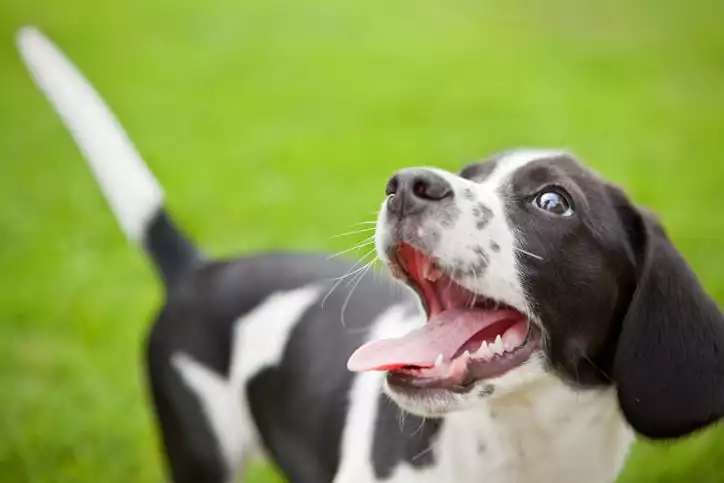Is Your Dog’s Mouth Cleaner Than Yours?
Unfortunately, the answer is no. A dog’s mouth and a human’s mouth both contain billions of bacteria belonging to roughly 700 different species.
Although we both have bacteria in our mouths, the bacteria in a dog’s mouth are mostly different species than the bacteria that inhabit a person’s mouth. These bacteria prefer a dog to be the host, and thankfully, they are not harmful to people.
However, there are similarities between the mouths of dogs and people. For instance, Porphyromonas is the bacterial family that causes periodontal disease in both dogs and people.
The first stage of periodontal disease is gingivitis, which means inflammation of the gums. Gingivitis is caused by bacteria in the mouth that form dental plaque. Billions of bacteria slowly build up on the surface of the teeth, which eventually leads to bad breath, gum recession, tooth root abscesses, and the destruction of bone around the tooth roots.
Early stages of periodontal disease are treatable for both dogs and people with at-home dental care, and just like people, dogs need their teeth professionally cleaned periodically.
Bacteria in Dog and Human Mouths
Both human’s and dog’s mouths are full of microbes and bacteria. However, while there are some of the same bacteria, there are also different kinds of bacteria in each species’ mouths. Porphyromonas is actually the bacterial family that causes periodontal disease in dogs and humans. The difference is that in humans, the actual bacteria is P. gingivitis and in dogs is P. gulae. Research shows that we actually have about the same number of different bacteria in our mouths as dogs, around 600.
Since most bacteria that are carried in a dog’s mouth are not zoonotic, you likely won’t catch any diseases from your little pup. However, you might want to avoid kisses if you know he regularly indulges in eating fecal matter or other less than appetizing items. So, yes, your dog’s mouth is full of bacteria and depending on their habits, they’re safe to share with.

Keeping your dog’s microbiome that is their mouth healthy is simply a matter of oral care. The best thing that you can do is brush your dog’s teeth regularly. Make sure to use dog specific toothpaste because human toothpaste has xylitol and that’s a toxic substance for pups. They have tasty flavors like peanut butter and chicken so that your dog is more willing to sit still for the brushing. You can use a soft bristled baby toothbrush or one that slips over your finger like a little glove. Your dog might fight you the first few times but if you stay consistent, they’ll get used to it and be more willing to sit still.
There are a few toys or treats that can help keep plaque and tartar from developing along with regular teeth brushing. Toys like a Kong are good to hide toothpaste or special teeth-cleaning treats in. Treats like Greenies Canine Dental Chews are great for maintaining your dog’s oral health. You could also provide a rawhide bone, but be very cautious with these as dog’s can harm themselves with rawhide. As soon as it gets soft, take it away from your dog. There are other chew toys with ridges or bristles that remove plaque and tartar as your dog chews. This is a win win for oral care and keeping your dog occupied and out of trouble. A word of caution, though. Toys alone will not keep your dog’s teeth as clean as they need to be. These need to be combined with brushing.
Water additives are becoming a popular solution because they’re so easy to use. They fight bad breath and are, as the name suggests, added to water. Some dog’s teeth are extra prone to decay. If this is the case for your dog, you may want to talk to your vet about dental sealants. Just like in people, these can help protect your dog’s teeth and, in turn, their total oral hygiene.
What diseases can you get from dog saliva?
One reason why the myth that dogs mouths are cleaner than humans has likely stuck around is because dogs and humans dont typically spread disease to each other by swapping saliva.
You can get sick however if your dogs saliva comes into contact with an open wound or broken skin, Karmin says.
Illnesses you can get from dog saliva include: